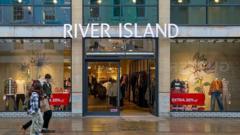Why Is River Island Closing 33 Stores?

River Island's Strategic Shift: Understanding the Implications of Store Closures
As one of the UK's cherished high street brands, River Island's recent announcement to close 33 shops has sent ripples throughout the retail landscape. With hundreds of jobs at stake, the decision reflects a broader trend affecting many traditional retailers. The shift towards online shopping and rising operational costs have forced River Island to reevaluate its business model. This article delves into the reasons behind these closures, the financial impact on the company, and what it means for the future of retail in the UK.
The Changing Face of Retail
The retail sector has undergone significant transformations over the past decade, primarily driven by technological advancements and changing consumer behaviors. Online shopping has surged, particularly following the COVID-19 pandemic, leading to a decline in foot traffic in physical stores. This trend has prompted retailers like River Island to reassess their brick-and-mortar presence.
Financial Struggles and Losses
River Island's financial health has been a cause for concern. The retailer reported a staggering £33.2 million loss in 2023, correlating with a 19% drop in sales. Such figures indicate not only a shift in consumer preferences but also the burdensome costs associated with maintaining a large physical footprint.
- High operational costs: Rising rents, utility bills, and staff wages contribute to the financial strain on retailers.
- Decreased foot traffic: With more consumers opting for online shopping, physical stores are often underperforming.
- Supply chain issues: Ongoing disruptions have further exacerbated costs and inventory management challenges.
The Decision to Close Stores
With 230 shops currently in operation, the decision to close 33 stores is significant. River Island's chief executive, Ben Lewis, expressed that the current retail landscape necessitates a "large portfolio of stores that is no longer aligned to our customers' needs." This sentiment underscores the need for retailers to adapt quickly to survive in a competitive environment.
Consultation and Impact on Employees
In light of the proposed store closures, River Island has committed to consulting with employees about potential job losses. The company aims to minimize redundancies and is exploring options for redeploying staff where possible. However, the looming question remains: how will these changes affect the workforce?
Employee Support and Redeployment
River Island has pledged to support its employees throughout this transition. The company has stated that no head office staff will be directly affected by the proposed closures, which may provide some reassurance to the broader workforce. However, for those working in the affected stores, the uncertainty can be unsettling.
Landlord Negotiations and Future Store Strategy
In addition to closing stores, River Island is seeking rent reductions from landlords at another 71 locations. This strategy aims to mitigate costs associated with maintaining a large number of stores while adapting to changing consumer preferences.
- Negotiating lower rents: This approach could help River Island maintain a presence in key locations while reducing financial burdens.
- Evaluating store performance: The retailer is likely to assess the performance of each store to determine which locations are viable long-term.
- Focus on e-commerce: Enhancing online offerings will be crucial as River Island shifts its focus toward digital retail.
The Importance of a Turnaround Plan
Amidst these challenges, River Island is working on a turnaround plan aimed at revitalizing its business. While the specifics of this plan have yet to be disclosed, it will likely involve a combination of cost-cutting measures, strategic investments in e-commerce, and a renewed focus on customer engagement.
The Future of River Island and the Retail Sector
The implications of River Island's restructuring extend beyond the company itself. As high street retailers continue to grapple with the evolution of consumer shopping habits, many are forced to adapt or risk obsolescence. The ongoing trend towards e-commerce is not merely a temporary phenomenon; it represents a paradigm shift in how consumers interact with brands.
What Does This Mean for Consumers?
Consumers may see a more streamlined shopping experience as retailers focus on enhancing their online platforms. However, the closure of physical stores may also mean fewer opportunities to experience products firsthand, a crucial aspect of retail that many shoppers still value. As River Island and other retailers navigate these changes, finding a balance between physical and digital presence will be paramount.
Conclusion: A Call to Adapt
The retail landscape is changing, and River Island's recent decision to close stores highlights the urgency for brands to adapt to new consumer preferences. While these changes may be difficult for employees and customers alike, they are essential for the survival and growth of the brand in an increasingly digital marketplace. As River Island embarks on this restructuring journey, it will be fascinating to see how it balances its rich heritage with the demands of modern retailing.
FAQs
What are the reasons behind River Island's store closures?
River Island's store closures are primarily due to the rise in online shopping and increased operational costs, such as rent and utilities, which have impacted the company's profitability.
How many jobs are at risk due to the store closures?
Hundreds of jobs are at risk as River Island plans to close 33 shops in the UK, although the company is committed to consulting with employees and minimizing layoffs.
What is River Island's plan for its future?
River Island is implementing a turnaround plan that includes negotiating lower rents with landlords, focusing on enhancing its online presence, and evaluating the performance of its stores.
Will any head office staff be affected by the closures?
No head office staff will be directly impacted by the proposed store closures, according to a company source.
What is the timeline for the store closure decisions?
Creditors will begin voting on the closure plan on August 4, with a court decision expected on August 7.
As River Island navigates these turbulent waters, what strategies do you think other retailers should adopt to survive in this new era of shopping? #RiverIsland #RetailTrends #EcommerceEvolution
Published: 2025-06-20 14:50:08 | Category: technology



